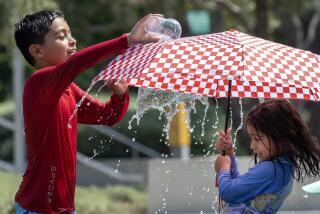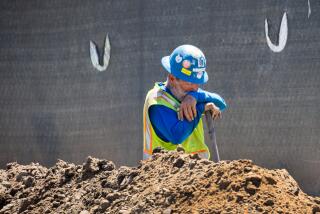Physical and Psychological Factors Can Cause Deaths
- Share via
Question: Why are elderly people more susceptible to heat-related illness than younger people?
Answer: One reason, experts say, is that the elderly are less sensitive to heat than they are to cold. As a result, old people living alone might not realize that it has become dangerously hot in their living space. According to the U.S. Centers for Disease Control and Prevention, “Elderly people do not adjust as well as young people to sudden changes in temperature. They are more likely to have a medical condition that upsets normal body responses to heat. They are more likely to take prescription medicines that impair the body’s ability to regulate its temperature or that inhibit perspiration.”
Q: Are there also psychological factors?
A: Yes, experts say some of the elderly are reluctant to use air conditioners. “Many of them, especially on the older end, were part of the World War II generation and they lived through the Great Depression,” said Valentine Villa, a professor of social work and associate director of the Institute for Applied Gerontology at Cal State L.A. “I think part of having gone through that is this idea that they have to conserve and watch their money.”
Q: Have other places experienced so many heat-related deaths?
A: Yes. Kansas City, Mo., and St. Louis together recorded 246 such deaths in 1980. And a massive heat wave in 1993 killed 118 people in Philadelphia. During a 1995 heat wave in Chicago, 739 people died.
Q: What parts of California were hit hardest?
A: The Central Valley had the most deaths. Within that region, Stanislaus County (the Modesto area) has so far recorded the highest number, followed by Fresno, Sacramento, Merced and Kern counties. Other hard-hit areas include Imperial and San Bernardino counties.
Q: How hot did it get in the Central Valley?
A: From July 22 to Wednesday, Fresno’s high temperature was 112 or greater -- a good 10 to 12 degrees above normal. Temperatures have since cooled.
Q: What’s the situation in Southern California?
A: Los Angeles County coroner’s officials said they have confirmed one heat-related death -- of a man in Lancaster. They said there were seven other deaths in which heat may have played a role. Suspected heat deaths also were reported in Riverside and San Diego counties. No confirmed cases have been reported in Orange and Ventura counties.
Q: How hot did it get in Southern California?
A: The heat wave set new highs last week, including 119 in Woodland Hills. But records were also set for high minimums: It didn’t cool much at night.
Q: The weather seems to be cooling?
Yes. Downtown Los Angeles is expected to top out in the low 80s over the next few days. The valleys will see highs in the high 80s. It’s still hot, but closer to normal temperatures for July.
Q: What are some tips for avoiding heat-related illnesses?
A: Drink plenty of water but avoid caffeine and alcohol, which cause fluid loss. Drink fruit juice or sports drinks to replace salt and minerals lost through sweat. Take advantage of shade and air conditioning. Children, the elderly and pets should never be left in an enclosed vehicle, even briefly. The temperature can quickly rise to life-threatening levels even with windows partly open.
Q: What is heatstroke?
A: The body gets so hot that the normal mechanisms for controlling temperature, such as perspiration, don’t work well or fail completely. The body’s temperature can rise to 106 or higher.
Symptoms include but are not limited to dizziness, hot and dry skin, high temperature, rapid pulse and headache.
Q: What is heat exhaustion?
A: The body loses vital salts and water through perspiration. Symptoms include heavy sweating, muscle cramps, weakness, headache, nausea, dizziness, tiredness and paleness.






